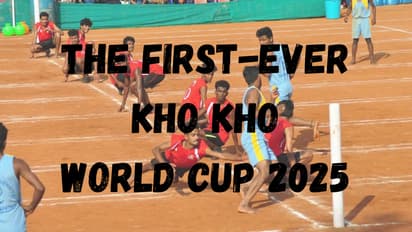
Traditional to India, the game of Kho Kho is likely to create history in the year 2025. It is a game played through centuries in rural and suburban parts of India, and has acted for a long time as a symbol of athleticism, teamwork, and strategy. While usually played nationally up until now, it is now moving towards the international arena with the advent of the Kho Kho World Cup 2025.
The first-ever tournament will be held from January 13 to 19 in New Delhi at the Indira Gandhi Stadium. It is a new tangential event that sports should cherish as they head onto the international stage carried by Kho Kho.
The origins of game Kho Kho go way back to ancient India, its lineage being regarded as one of the traditional games commonly played by the children all over fields. Since then, the game evolved to take a pretty definite form, further gaining not only acceptance throughout India, but worldwide under local traditions. It is a fast-paced, nimble, and clever game, occupying a unique position in the sports culture of India. This is going to be the first journey into gaining international recognition, and the Kho Kho World Cup 2025 heralds the exciting beginning of that journey.
Kho Kho World Cup 2025 will take the game to unimaginable heights. With 39 countries, including India, participating in this tournament, it has enormous potential for Kho Kho to exceed its Indian origins. South Africa, England, Argentina, Nepal, Australia, and other nations will join the fray, marking the rising global appeal of the sport.
The tournament will feature both men’s and women’s categories, commencing daily from 10:30 am till 9:30 pm. After a colourful opening ceremony on January 13, India will take up the challenge against Nepal in the men's category, while the English women will duel with their Australian counterparts to initiate games in the tournament. Indira Gandhi Stadium will remain the venue for the matches, providing an imposing platform for this momentous event.
In the men’s category, the tournament is divided into four groups (A-D), with each group consisting of four teams. The top two teams from each group will advance to the knockout stage, which will begin with the quarterfinals. India’s men’s team, led by Pratik Waikar, is placed in Group A, where they will compete against Nepal, Peru, Brazil, and Bhutan.
In the women’s category, the tournament will also feature four groups. Group D will have five teams, and as with the men’s competition, the top two teams from each group will progress to the knockout stage. India’s women’s team, captained by Priyanka Ingle, will face South Korea in their opening match on January 14th.
Groupings for Men’s Tournament:
• Group A: India, Nepal, Peru, Brazil, Bhutan
• Group B: South Africa, Ghana, Argentina, Netherlands, Iran
• Group C: Bangladesh, Sri Lanka, South Korea, USA, Poland
• Group D: England, Germany, Malaysia, Australia, Kenya
Groupings for Women’s Tournament:
• Group A: India, Iran, Malaysia, South Korea
• Group B: England, Australia, Kenya, Uganda, Netherlands
• Group C: Nepal, Bhutan, Sri Lanka, Germany, Bangladesh
• Group D: South Africa, New Zealand, Poland, Peru, Indonesia
The Indian men's team will be arranged and led under the captaincy of Pratik Waikar, with the core of the team constituted from among players like Sachin Bhargo, Nikhil B, and Aditya Ganpule. The performance of this team will be under close observation by the millions of fans, with India not just being the host country but also a heavyweight favourite to perform well in this maiden tournament.
Priyanka Ingle will captain the side along with Ashwini Shinde, Reshma Rathore, and Nirmala Bhati, for the Indian women's team. Both teams will be under the expertise of their coaches, Ashwani Kumar and Sumit Bhatia, for the boys and girls respectively.
Indian Men's Team include Pratik Waikar (Captain), Sachin Bhargo, Nikhil B, Suman Barman, Pabani Sabar, Suyash Gargate, Aditya Ganpule, Akash Kumar, Aniket Pote, Mehul, Ramji Kashyap, Gowtham MK, Subramani V, S Rokeson Singh. The reserve players for the Indian men's Kho Kho team include Akshay Bangare, Rajvardhan Patil, and Vishwanath Janakiram.
Indian Women's Team include Priyanka Ingle (Captain), Ashwini Shinde, Reshma Rathore, Bhilar Devjibhai, Nirmala Bhati, Neeta Devi, Chaithra R, Subhashree Sing, Magai Majhi, Anshu Kumari, Vaishnavi Bajrang, Nasreen Shaikh, Meenu, Monica, and Naziya Bibi. The reserve players include Sampada More, Ritika Siloriya, and Priyanka Bhopi.
Kho Kho World Cup 2025 promises to be thrilling and expected to attract global attention. It will be broadcasted live through Star Sports Network, while it can be streamed on Disney+ Hotstar for fans worldwide to enjoy this historic tournament experience.
The Kho Kho World Cup is a tournament, of course, but it is also a gathering of fans. Booking is open, with free tickets for those who wish to witness the rise of this sport to a global stage. Booking can be done through District by Zomato and Insider.in. Whether you are in New Delhi or anywhere else, this is a once-in-a-lifetime chance to be a part of Kho Kho's global debut.